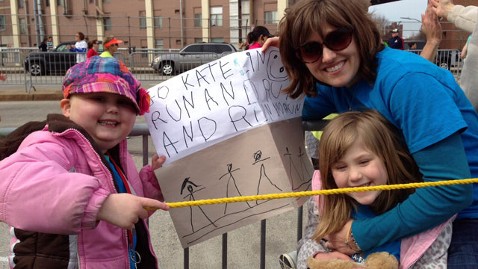Family's Life Under Lockdown: Missed Chemo, Locked Doors

(Jane Roper)
Jane Roper was supposed to head to Boston Children's Hospital Friday morning so that her 6-year-old daughter, Clio, could receive a round of chemotherapy to treat her leukemia. But instead of getting treatment, Clio and the rest of Roper's family were stuck indoors after the lockdown of Boston and its surrounding suburbs.
In the neighborhoods next to Roper's Medford, Mass., home, numerous law enforcement officers were going door-to-door in search of Dzhokhar Tsarnaev, the remaining suspect in the Boston Marathon bombing.
While Roper said a slight delay in Clio's chemotherapy treatment shouldn't affect her health, Roper's nerves have been frayed in the aftermath of the Monday's bombings and now the violent manhunt that resulted in the death of one suspect and an MIT security officer.
"It all hits so close to home," said Roper. "This is crazy. You never expect to see the whole area under siege."
Roper and her twin six-year-old daughters, Clio and Elsa, were at mile 25 of the Boston Marathon cheering on runners as they neared last mile of the race. One of the runners, Katelin Kalal, was running in honor of Clio for the Dana-Farber Cancer Institute.
About 10 minutes before the bombs exploded, Kalal ran up to the girls and gave them a big hug before heading toward the finish line.
Once Kalal left, Roper headed towards Boston Children's Hospital with Clio. The 6-year-old had been hospitalized for a week with fevers and other complications from her chemotherapy. Clio had been given special permission by her doctors to attend the race for a few hours.
As she drove Clio back to the hospital, Roper first started hearing reports of explosions at the race's finish line. Ambulances began to stream past her.
"Someone told us what had happened. We thought 'Oh my god, [Kalal] could be at the finish line,'" said Roper. "I was trying to contain myself and not get upset."
Hours after the blast, Roper finally heard that Kalal was unharmed. Later that night, Roper visited the ICU ward where her own daughter had been a patient six months earlier. There were armed guards at the door.
"I brought the doctors muffins [because] I knew the parents wouldn't want to eat anything," said Roper.
Not wanting to frighten her daughters, but unable to keep all information from them in the hospital, Roper tried to explain the bombing without giving details.
"We told them there were some explosions and bad people wanted to hurt people," said Roper. "You dole it out bit by bit and try not to scare them."
Roper and husband, like many parents, have struggled with how to protect their children while still explaining terrifying events such as the bombing or the lockdown. But even after trying to keep the worst from them, Roper said, they still had some anxiety.
"They asked if I locked the door," Roper said of her daughters. "They said, 'Don't you want to lock it? I don't want the bad guys to get in.' That's heartbreaking."
On Thursday, Clio was released from the hospital, and the family hoped to take her out for breakfast with her sister on Friday morning. It would have been a bit of normalcy for a family going through its own ordeal. But instead, Roper woke up to find that residents of Boston and its suburbs were advised to remain indoors with the doors locked. The family field trip for breakfast would have to wait for another day.
Cooped up indoors with her children, Roper was relying on social media for news because the televised news could scare her girls. But even with that extra safeguard, Roper said, her daughters still know not everything is normal.
"One of them just said, 'This day is weird,'" said Roper. "This is a day unlike any other day, and I don't want to experience it ever again."